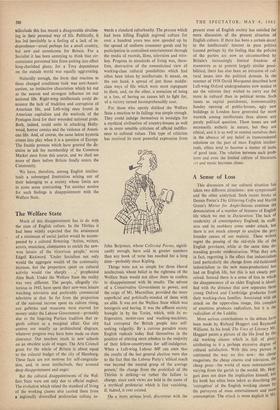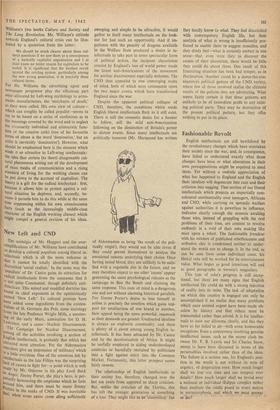A Sense of Loss
This discussion of our cultural situation has taken two different directions: one symptomatic and the other analytical. Such recent books as Dennis Potter's The Glittering Coffin and Martin Green's Mirror• for Anglo-Saxons continue the denunciation of a number of features of English life which we met in Declaration. The lack of modernity of contemporary England, its stuffi- ness and its snobbery come under attack, but there is not much attempt to analyse the pro- founder causes of our malaise. These writers regret the passing of the old-style life of the English provinces, while at the same time de- manding greater modernisation. What they are, in fact, regretting is the effect that industrialism (and particularly the change from old-fashioned industrialism to the new mass-production) has had on English life, but this is not clearly per- ceived. Instead there is a sense of loss in which the disappearance of an older England is identi- fied with the distance that now separates these young Oxford and Cambridge graduates from their working-class families. Associated with an attack on the upper-class image, this complex of emotions produces radicalism, but it is the radicalism of the Luddite.
More serious contributions to the debate have been made by Richard Hoggart and Raymond Williams. In his book The Uses of Literacy Mr. Hoggart paints a picture of the life lived by the old working classes which is full of piety attributing to it a perhaps excessive degree el cultural satisfaction. With this rosy picture is contrasted the way we live now: the cheap magazines, the cheap cinema and television, the cheap press—the world of mass entertainment, varying from the garish to the sordid. Mr. Hog- gart does not draw the implication himself, but his book has often been taken as describing the 'corruption' of the English working classes by the purveyors of mass entertainment and mass consumption. The attack is more explicit in Mr' Williams's two books Culture and Society and The Long Revolution. Mr. Williams's attitude towards England's cultural crisis can be illus- trated by a quotation froin the latter: We should be much clearer about these cul- tural questions if we saw them as a consequence of a basically capitalist organisation and I at least know no better reason for capitalism to be ended. It is significant that the liveliest revolt against the existing system, particularly among the new young generation, is in precisely these cultural terms.
For Mr. Williams the advertising agent and newspaper proprietor play the villainous part once allocated by Left-wing mythology to arma- ments manufacturers, the 'merchants of death,' as they were called. His own view• of culture— which can roughly be called populist—seems to me to be based on a series of confusions as to the meanings covered by the word and to neglect the tmessarily individual and aristocratic func- tion of the creative artist (one of his favourite terms of abuse is the word 'dominative,' but an artist is inevitably `dominative'). However, what should be emphasised here is the element which made it so attractive to Left-wing intellectuals: the idea that certain (to them) disagreeable cul- tural phenomena arising out of the development of mass media of communication and a rising standard of living for the working classes can be put down to the account of capitalism. The theory is a gift for the radical intellectual: first, because it allows him to protest against a cul- tural situation he deplores, and, secondly, be- cause it permits him to do this while at the same time suppressing within his own consciousness facts (such as the increasingly middle-class Character of the English working classes) which might compel a general revision of his ideas.







































 Previous page
Previous page